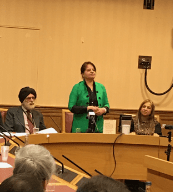
[Image above: Lady Singh addresses the audience at Billion Women Parliamentary event]
The event focused both on the successes and challenges faced by women in modern society, from both a cultural and religious perspective.
Speakers included Lord and Lady Singh, Lord Sheikh, Lord Loomba, Criminologist Prof Aisha Gill from the University of Roehampton, Spoken Word Artist Jaspreet Kaur, the founder of Billion Women Mani Bajwa and business woman Mrs Amar Kaur Maker.
Event organiser Lady Singh told the audience the Suffragettes had fought tirelessly for women’s equality in Britain over a century ago. She told audience members they had thrown themselves under horses, chained themselves to railings outside Parliament and had suffered huge indignities. Referring to Emily Pankhurst Lady Singh said, “We owe her a lot.” But she warned Sikh women who had been given equality from day one by Guru Nanak – over five hundred years ago, that they should not be complacent.
She said, “Women have been fighting for equality with men right up to the twentieth century and in some ways even today. The Gurus gave Sikh women equality. It was handed on a plate. They did not have to hold rallies, protest marches, hunger strikes, getting under the hooves of horses or chaining themselves to the railings. They did not have to struggle to get rid of the obnoxious social customs such as sati, purdah, dowry and female infanticide”
She went on: “We Sikh women having got equality need to discharge our responsibilities to ensure we do not loose it. If we do not practice equality in our own homes and gurdwaras, our women in the future will loose it. Guard it by practicing it.”
Entrepreneur Mrs Amar Kaur Maker told the audience that she took inspiration from Sikh teachings when her husband passed away. She was left with the daunting prospect of supporting her family and running a business. Despite her challenges, in 2009 she was given a national ‘entrepreneurial excellence award’. Mrs Maker said, “I felt abandoned but somehow carried on with strength from my faith and inspiration from the life of Guru Gobind Singh.”
Attendee Rani Bhilku from Slough based organisation Jeena said, “It was refreshing to see so many women from across the generations attend, and I particularly resonated with Jaspreet Kaur’s poetic words on the night.”


